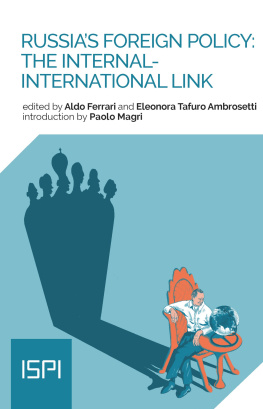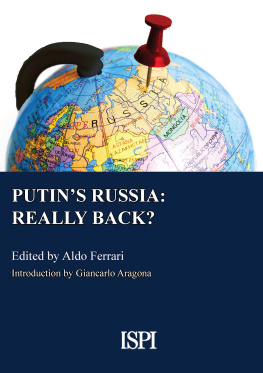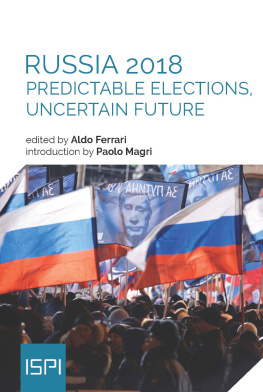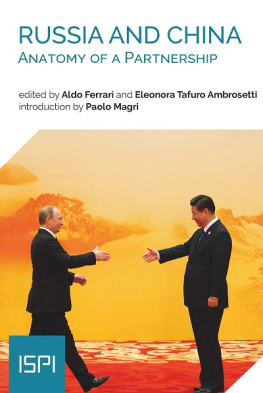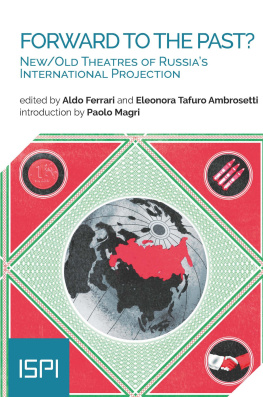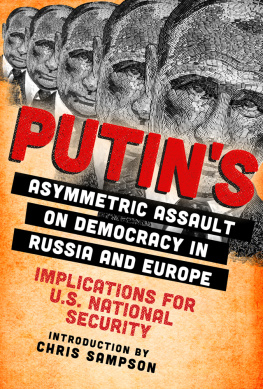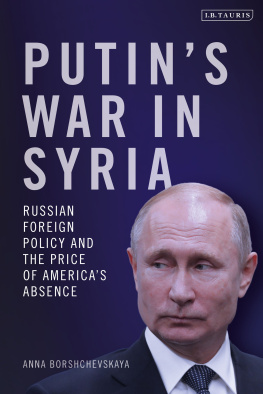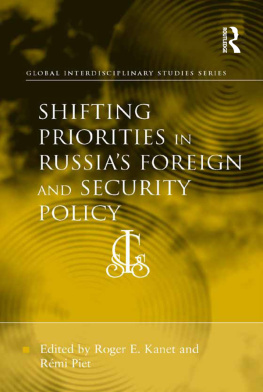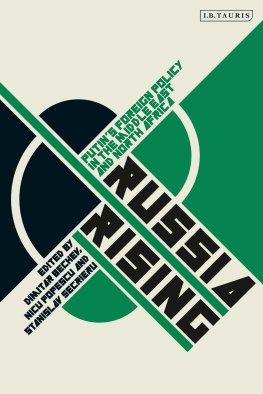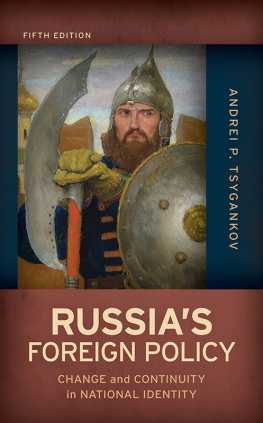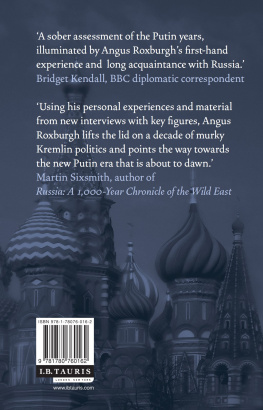2021 Ledizioni LediPublishing
Via Antonio Boselli, 10 20136 Milan Italy
www.ledizioni.it
Russias Foreign Policy: The Internal-International Link
Edited by Aldo Ferrari and Eleonora Tafuro Ambrosetti
First edition: May 2021
Image cover by Francesco Fadani
Print ISBN 9788855264907
ePub ISBN 9788855264914
Pdf ISBN 9788855264921
DOI 10.14672/55264907
ISPI. Via Clerici, 5
20121, Milan
www.ispionline.it
Catalogue and reprints information: www.ledizioni.it
This Report is realized with the support of the Policy Planning Unit of the Ministry of Foreign Affairs and International Cooperation pursuant to art. 23-bis of Presidential Decree 18/1967.
The opinions contained in this Report are solely those of the authors and do not necessarily reflect the opinions of the Ministry of Foreign Affairs and International Cooperation and ISPI.
Introduction
What drives Russias foreign policy in Vladimir Putins times? Why did the Kremlin decide to annex Crimea, occupy South Ossetia, intervene in Syria, or give its blessing to Nord Stream II? Which are the most important groups affecting Moscows foreign policy decisions? And are Putin and his entourage more swayed by domestic or international developments?
More than two decades into Putins rise as Russias uncontested leader, many facets of the countrys foreign policy decisions remain obscure, shrouded under a thin veil of vagueness and secrecy. And sure, the criteria followed by leaders and their aides in foreign policy choices may change over time and place, so that many of us looking for simple explanations will often be left wanting. However, the fascination with how Russia has been able to punch above its weight for over a decade now, being able to play its part as one of the main powers in the current international system, is well founded. The fact that we are still left in the dark over the interplay of domestic and international factors in Russias major foreign policy decisions is therefore problematic, as the mystery surrounding such actions lends itself to being either romanticized or outright condemned, but often lacks objective analysis.
A case in point is the recent poisoning and, later, incarceration of Alexei Navalny, Russias most famous opposition leader. Were it not for Moscows sporadic but ruthless crackdowns against dissent (and, over the past year, the relentlessness with which the regime went after a specific person), it could be argued that Navalny would not have become an international martyr, instead remaining a prominent but not too powerful opponent. Moscows choice of a hard stance has not only dented Putins stability at home, but appears to have undermined its own prospects at reconciliation with the West at least in the short term. Indeed, just a few weeks before the release of this Report, G7 leaders went out of their way to condemn Russias irresponsible and destabilising behaviour, explicitly mentioning Navalnys poisoning and noting with regret the deterioration in Russias relations with Western countries.
As the Navalny affair unfolded, in February this year, another coup de theatre left foreign observers puzzled. As the EUs High Representative for Foreign Affairs and Security Policy, Josep Borrell, visited Moscow, Russian Foreign Minister Sergei Lavrov seized on the opportunity to label the EU an unreliable partner, sending European diplomacy into a spin. It was the same phrase that the German chancellor, Angela Merkel, had used to label Trumps United States in 2017, plunging transatlantic relations to their lowest point in decades, and Lavrov probably knew this. Most importantly, it was unexpected. Lavrovs decision to condemn the EU arrived at one of the most delicate times in relations between Brussels and Moscow over the past few years. Russia could have leveraged Borrells visit, coming on the heels of Navalnys incarceration, as an attempt to open a new window for dialogue with the EU. Instead, it chose to bite Borrells extended hand.
These two recent cases highlight how unpredictable these decisions may appear to untrained eyes. This Report is an attempt to do just that: to shed some light on Russias foreign policy decision making, highlighting the links between internal and international factors, and showing how their interplay can explain (at least in part) decisions that might have been considered surprising beforehand.
Alexander Graef kicks off the discussion posing a very relevant question: to what extent do Russian foreign policy think tanks manage to have an impact on their countrys foreign policy-making process? The question of impact does not only affect Russian foreign policy think tanks, of course; as a matter of fact, it haunts most of the worlds think tanks, which sometimes fail to influence policy-makers or even to deliver their policy recommendations to them. Yet, the informal nature of Russian politics exacerbates this failure, as well as posing methodological issues for the researchers trying to analyse this issue. Graef argues that, despite the comparatively high number of Russian think tanks, few of them have real impact. Their political prominence is linked to their personal access to the president and the staff of his administration. Even in that case, being close to Putin does not automatically imply influence. Instead, the political volatility deriving from the characteristics of the Russian regime often leads to the existence of multiple interest groups within the administration.
The Russian Orthodox Church is arguably much more successful than think tanks in influencing Russian diplomacy and in its role in promoting conservatism in Russian foreign policy. The Churchs bilateral cooperation with the Kremlin has been on the rise for some years now, to the point that critics argue that it became a propaganda machine. But Alicja Curanovi shows in her chapter how the Church-State relationship is more complex than it seems. She emphasises the often-unnoticed dynamic nature of conservatism in Russian politics, which has been evolving for over a decade. After a description of conservatism in contemporary Russian politics, her chapter touches upon the domestic factors affecting Russian diplomacys conservative agenda and focuses on the Russian Orthodox Church as the most influential conservatist lobbyist considering four timely cases: the intervention in Syriaand the rise in Russian activities in Africa, Hungary, and China.
What about Russias liberals? Do they still matter in todays Russia? And, most importantly, what does it mean to be a liberal in Russia? Andrei Kolesnikov notes the extreme vagueness of the term liberalism in Russian social life, as liberals are simultaneously understood as supporters of the market economy, as Westernised citizens and people with non-traditional sexual orientations, as opponents of the governments strong hand, and more broadly as people with democratic views. Traditionalists simply label them everything that is bad and anti-state. The author takes us on a journey into Russias history to trace the origins of Russian-style liberalism, introducing us to centuries-long debates around Russias identity and belonging/non-adherence to Europe. He also looks at what is left of political liberals currently and analyses their influence (or lack thereof) in shaping Russian policies vis--vis the West.

